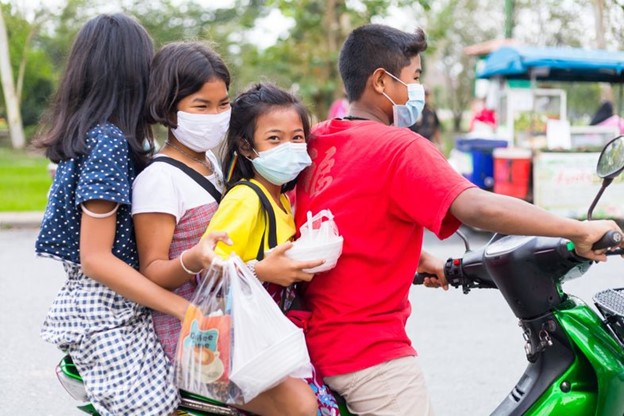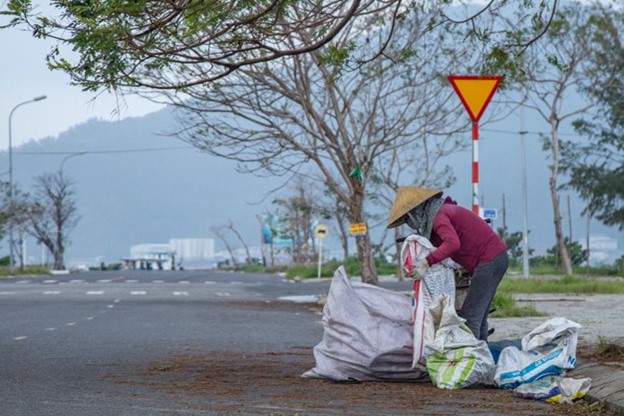 Closing the Loop: Scaling up Innovation to Tackle Marine Plastic Pollution in Southeast Asian Cities
Seizing the Urban Opportunity to Clean Up our Ocean
Closing the Loop: Scaling up Innovation to Tackle Marine Plastic Pollution in Southeast Asian Cities
Seizing the Urban Opportunity to Clean Up our Ocean

Challenges
Plastic waste in urban waterways endangers human health, marine ecosystems and wildlife, as well as local livelihoods. Plastic pollution is a transboundary issue requiring a response and cooperative action plans on a regional level. The COVID-19 pandemic further exacerbated the plastic waste problem by dramatically changing patterns of plastic use and management in cities. There was a significant increase in the use of single-use plastics, both due to hygiene concerns and a shift to takeaway/home delivery services. There was also a dramatic increase in the use of Personal Protective Equipment (PPE), particularly outside of the home, in environments where access to waste recycling infrastructure is more limited. The management of plastic waste also changed due to the pandemic’s adverse effects on municipal waste management capacities, impacting the livelihoods of a significant number of informal workers in the sector. To combat the issue, ESCAP provided technical cooperation support towards the comprehensive measurement, monitoring and management of plastic pollution in four Asian cities and countries.
Towards a Solution
The "Closing the Loop" project, implemented by UN-ESCAP; the ASEAN Secretariat and the Institute for Global Environmental Strategies, and supported by the Government of Japan, was built on the demand and evidence generated in pilot cities of Pune, India, and Bangkok, Thailand, from the 2018-2019 ESCAP Phase I project, entitled “Closing the Loop: Unlocking the informal economy to recover plastic waste and reduce marine pollution as part of an inclusive circular economy approach”.
The project was implemented on a demand basis in four ASEAN countries, namely Indonesia, Malaysia, Thailand and Viet Nam with the expected outcome that “four cities in ASEAN develop policies and corresponding investment strategies to address plastic waste pollution and leakages into the marine environment”. It was designed with the objective to “reduce the environmental impact of ASEAN cities by addressing plastic waste pollution and leakages into the marine environment”.
In line with this objective, the project and its partners developed tools using the latest technology to assist governments and organizations in measuring and tracking plastic waste in their respective communities. In doing so, the project used artificial intelligence, satellite imaging, drones and waste flow modelling to pinpoint the “source to sea” movement of how plastic leaks into the marine environment from cities.
The project organized city-to-city peer learning events along key milestones in the development of their action planning process which served to identify “joint solutions to common problems”. This facilitated the transmission of good practices and lessons learned in areas, such as addressing data gaps on the informal waste economy, strengthening municipal solid waste management systems and engaging households for effective segregation of waste.
Due to the effects of the COVID-19 pandemic, many capacity-building activities planned shifted to virtual formats. The project launched a self-paced, free eLearning programme, Cities and Marine Plastic Pollution, Building a Circular Economy, which has engaged over 450 trainees across the project cities and beyond. The seven-module course shows how to measure, monitor and manage urban plastic pollution leveraging the common knowledge from the collaboration of the four participating cities.
For sustainability, the project established a unique South-South regional platform to promote regional collaboration on cities and marine plastic waste mitigation, chaired by ESCAP and the ASEAN Secretariat, with a wide range of complementary agencies and institutions to take forward research and technical cooperation on cities and marine plastic pollution within the Southeast Asian region beyond the project lifecycle in support of the implementation of the ASEAN Regional Action Plan on Marine Litter.
ASEAN countries, being among the highest contributors to ocean plastics at the time of project design, have led to the development of regional and national-level plans and frameworks. However, while waste management is under the purview of city governments, such plans and strategies were absent at the city level. Furthermore, in the four target cities of Surabaya (Indonesia), Kuala Lumpur (Malaysia), Nakhon Si Thammarat (Thailand) and Da Nang (Viet Nam), earlier efforts to manage plastic waste were made under overall solid waste management initiatives, resulting in limited evidence and focus on rising levels of plastic waste, specifically.
The project made substantial progress in providing target cities and key stakeholders with data, knowledge and skills to monitor, analyse, report on and manage plastic waste using innovative technologies. Baseline assessments using a “plastic pollution calculator” in partnership with the International Solid Waste Association for all four cities quantified the plastic waste leaking into the urban and marine environment. This information has resulted in the development of a unique action plan for each of the four target cities. Moreover, under the "Closing the Loop" project, for the first time, a digital tool was developed and deployed in a short time to monitor the plastic waste flow using innovative technologies.
Under the supervision of ESCAP, the project capitalized on the capacities of several international, national and local experts and partner institutions to implement and achieve project outputs. The demonstrated political will in the development and approval of the action plans and the capacity of local experts developed by the project are factors that support the sustainability of the project outputs. In line with the landmark 2022 UNEA Resolution 5/14 aimed at ending plastic waste pollution, ESCAP is currently identifying additional financial resources to continue investments for improvements in technical know-how, refining digital tools and implementing city waste management policies for a subsequent phase of the project.
Contact Information
Countries involved
Supported by
Implementing Entities
Project Status
Project Period
URL of the practice
Primary SDG
Primary SDG Targets
Secondary SDGs
Secondary SDG Targets
Similar Solutions
| NAME OF SOLUTION | Countries | SDG | Project Status | |
|---|---|---|---|---|
A Billion Brains: Smarter Children, Healthier Economies High Level Meeting on South-South Cooperation for Child Rights |
Indonesia, Japan, Malaysia, Thailand, Viet Nam | 17 - Partnerships for the Goals | Completed | View Details |
Adaptation for Smallholder Agriculture Programme Establishing better working conditions for smallholder farmers through the use of good practices and new technologies |
Indonesia, Japan, Malaysia, Thailand, Viet Nam | 08 - Decent Work and Economic Growth 11 - Sustainable Cities and Communities 13 - Climate Action 15 - Life on Land | Ongoing | View Details |
ADAPT PLAN in Malawi |
Indonesia, Japan, Malaysia, Thailand, Viet Nam | 01 - No Poverty 05 - Gender Equality 11 - Sustainable Cities and Communities | Ongoing | View Details |
Addressing Racial and Ethnicity-based Discrimination and Strengthening the Protection of Rural Afro-descendants UNFPA supports data disaggregation as a tool to fight racism and ethnic discrimination |
Indonesia, Japan, Malaysia, Thailand, Viet Nam | 01 - No Poverty 02 - Zero Hunger 03 - Good Health and Well-being 05 - Gender Equality 06 - Clean Water and Sanitation 11 - Sustainable Cities and Communities 16 - Peace and Justice Strong Institutions | Ongoing | View Details |
Adolescent Nutrition Programme to Address the Triple Burden of Malnutrition in Indonesia Nourishing today’s teens and tomorrow’s future in Indonesia |
Indonesia, Japan, Malaysia, Thailand, Viet Nam | 02 - Zero Hunger 05 - Gender Equality | Completed | View Details |



